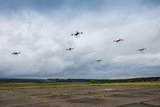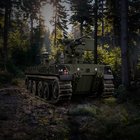Singaporean Fuel Cell Boosts Capabilities of Unmanned Reconnaissance Aircraft
Aeropak, a next-generation fuel cell power system recently developed by Horizon Fuel Cell Technologies will increase the flight endurance of small and stealthy electric unmanned aerial systems (UAS) by as much as 300 percent.
The fuel cell technological advancements will bring significant enhancements to UAS, making them more effective in persistent intelligence, surveillance and reconnaissance (ISR) missions, a main focus area for leading defense and security organizations around the world.
Starting evaluation shipments this summer, Horizon's new Aeropak brings an immediate performance improvement over today's best available battery systems. Designed for high-impact and able to operate at up to 22,000 feet (6500m), the complete system integrates Horizon's record-setting fuel cell technology with new refillable dry-fuel cartridges.
Storing 900Wh of usable electrical energy and weighing just 4.4 lbs (2kg), the Aeropak provides up to four times the endurance capability of advanced lithium batteries currently in use. The miniaturized power system makes it very easy to use as drop-in replacement for battery packs currently in service, eliminating costly airframe modifications.
According to G2 solutions, a Seattle-based market research firm specializing in Aerospace/Defense, "The use of pervasive UAS is increasing because the persistent ISR capabilities they bring are unmatched."
Electric-powered UAS bring important capabilities - reduced acoustic signature, smaller size - and offer real advantages - lower acquisition cost, fuel savings - to ISR operations. Where battery performance limits the effective use of these promising systems, the Aeropak next-generation fuel cell power systems will improve versatility and open new mission possibilities for smaller electric UAS.
In addition to increasing flight endurance, the new fuel cell system also makes it possible for small tactical UAS to integrate more power-hungry electronic devices such as electro-optical sensors, infrared cameras and laser designators. The new fuel cell systems can also be used to power remote ground systems and recharging stations, or even serve as an auxiliary electric power supply for larger systems.
Horizon's Aeropak is the first of a series of commercially available fuel cell systems that can be customized to fit a variety of platforms and scaled up to provide as much as several kilowatts of power, making it suitable for all sizes and configurations of electric powered UAS.
Over the next 10 years, industry analysts expect the acquisition market for UAS to exceed $44 billion in the U.S. alone. According to Ron Stearns of G2 solutions, "Fuel cells have the potential to improve the Size, Weight and Power (SWaP) configuration for tactical UAS propulsion, leading to increased UAS endurance or expanded sensor and/or communications-relay capabilities."
Horizon Fuel Cell Technologies has been demonstrating its unique capabilities with a series of pioneering flights, which included "Hyfish," a 1kW fuel cell powered jet-wing UAS integrated by the German Air & Space Agency (DLR) and the "Pterosoar," which set a new FAI world record for distance in 2007 with the support of NASA. The new Aeropak will be displayed at the 2009 Paris Air Show (booth B075) alongside several UAS airframes powered by Horizon's fuel cell power systems.
More from Uncrewed Vehicles
-
![Ready for the race: Air separation drone swarms vs. air defence systems]()
Ready for the race: Air separation drone swarms vs. air defence systems
As the dynamics of aerial combat rapidly evolve, Chinese scientists have engineered a sophisticated air separation drone model that can fragment into up to six drones, each capable of executing distinct battlefield roles and challenging the efficacy of current anti-drone defences such as the UK’s Dragonfire laser system.
-
![Israel’s MALE UAVs ‘must adapt’ to Iranian-made air defences]()
Israel’s MALE UAVs ‘must adapt’ to Iranian-made air defences
Advancements in air defence technologies have begun to reshape aerial combat dynamics in the Middle East, as illustrated by recent events involving the Israeli Air Force and Hezbollah.
-
![Hundreds more UAS sent to Ukraine forces with thousands more on the way]()
Hundreds more UAS sent to Ukraine forces with thousands more on the way
Both sides of the Russia-Ukraine war have been using UAS for effective low-cost attacks, as well as impactful web and social media footage. Thousands more have now been committed to Ukrainian forces.
-
![AI and software companies selected for US Army Robotic Combat Vehicle subsystems]()
AI and software companies selected for US Army Robotic Combat Vehicle subsystems
The US Army has intentions to develop light, medium and heavy variants of the Robotic Combat Vehicle (RCV) as part of the branche’s Next Generation Combat Vehicle family.
-
![DroneShield to improve software of DroneSentry-X C-UAS system under new contract]()
DroneShield to improve software of DroneSentry-X C-UAS system under new contract
DroneSentry-X, a cross-vehicle compatible, automated 360° C-UAS detect and defeat device, can offer 360° awareness and protection using integrated sensors. According to its manufacturer, it is suitable for mobile operations, on-site surveillance and on-the-move missions.
-
![Ukraine takes delivery of new indigenous C-UAS systems]()
Ukraine takes delivery of new indigenous C-UAS systems
Funded by the country’s former president, the new C-UAS systems will be sent to the frontline where they have already been tested against Russian invading forces.


























